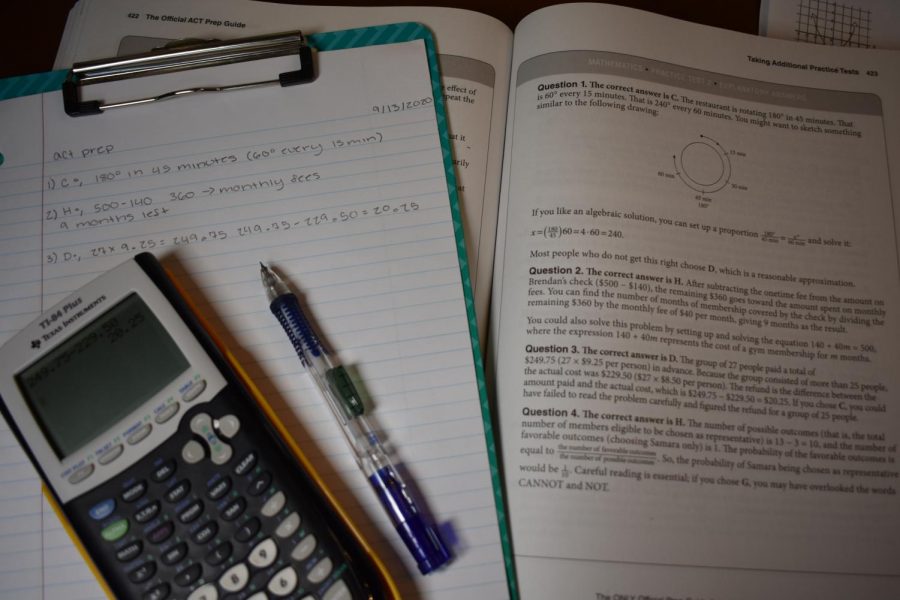Why Some Colleges No Longer Require the ACT or SAT
October 9, 2020
Lingering in the back of many students’ minds throughout their high school years, it creeps up on them before they know it: the dreaded standardized tests. Whether it is the SBAC test required for graduation or the ACT and SAT scores that narrow down college options, no one seems to particularly enjoy sitting at a desk with a pencil and a paper that determines your future. Standardized testing may be considered a necessary evil, but the “necessary” part has been debated by students, parents, teachers, and college administrators throughout the years. Do these tests mean anything, or are they old-fashioned and discriminatory?
It is no secret that ACT and SAT scores have been a deciding factor in college applications. Typically taken during spring of junior year, scores for these tests are supposed to measure what a student has learned throughout their years of high school. With the pandemic preventing many students from taking the test, some colleges are becoming test-optional or test-blind temporarily, and others are considering becoming that way permanently.
There is a difference between a test-optional college and a test-blind college. Test-optional colleges allow applicants to send in their scores and have them considered, but they will not penalize students for opting out. On the other hand, test-blind colleges will not view or consider test scores at all. Many test-optional or test-blind schools are choosing to become either one of these due to the pandemic, but schools are moving on from standardized testing for other reasons as well.
The extent to which standardized testing is an accurate measurement of student achievement is controversial. A study conducted by William Hiss, former Dean of Admissions for Bates College, found that there was a negligible difference of “.05 percent of a GPA point” between submitters and non-submitters. Additionally, the study found that students with higher GPAs and lower test scores were more successful in college than students with lower GPAs and higher test scores.
The ACTs and SATs can put too much stress on students. English teacher Kylie Cavotta, who took the ACT, felt that the test was “reflective of student knowledge” but that “too much weight rests on one score.” Students who typically do well in class may have test anxiety that prevents them from getting a desirable score, causing many otherwise qualified students to be turned away from colleges.
Standardized testing tends to favor students with a higher economic status. The ACTs and SATs usually require extensive prep for students who wish to score well. The costs of test-prep can reach beyond, according to Mikhail Zinshteyn of The Atlantic, “a week’s pay for the median household income.” Wealthy students score higher on average than their lower-income peers.
Differences in test scores between races also reflect systemic racism and educational inequality. Although economic disparities are one explanation, the actual content of the test favors white students. A study conducted by two professors, Maria Veronica Santelices and Mark Wilson, found that the verbal tests were biased against black students regardless of education. The wording used was more likely to reflect that of commonly used phrases in predominantly white communities, thus giving white test-takers an advantage.
If not test scores, then what? GPA and college essays are two factors that are also considered. However, they come with issues of their own. Junior Charlotte Dennie believes that GPA is better, but not perfect. “I feel it’s more accurate than the ACT and SAT because it’s not a single test, but it depends. There’s so many different factors.” An example of a factor would be grade inflation, where students may be awarded higher grades than they can get on their own. Varying curriculum can make GPA inconsistent as well. Meanwhile, college essays can reveal beyond what numbers show, but they do not assess how well a student can retain information like the ACTs or SATs do.
With restrictions due to COVID-19, in-person testing has been widely unavailable. Even if it were an option, would students feel comfortable being around others for multiple hours with masks and social distancing? Some students who were interviewed would, including senior CJ Gorey. “I think if you’re willing to take the risk, people should be allowed to take the test,” he said.
Another question is whether standardized tests could be conducted online. Perhaps they could, but the AP Tests that were administered online last spring displayed the risks of digital testing. College Board faced criticism both for technical issues and for the content of the tests. The tests were in a condensed, 45-minute open-note format unlike the regular three-hour closed-note structure. Additionally, errors with submissions caused many students to be unable to submit their test, forcing them to retake later in June.
Cheating is also a problem when it comes to taking tests online. While there are programs that track activity as well as the use of webcams, freshman Anna Dickinson said, “It’s easier for people to cheat.”
Some schools have already planned to implement test-optional or test-blind policies beyond the pandemic, such as the University of California system. According to Nick Anderson of The Washington Post, the UC board voted to “make the SAT and ACT optional for all applicants for two years and then to eliminate the tests for in-state applicants after that.”
Although the coronavirus has taken away opportunities, it has also allowed for new ones, such as the opportunity for colleges to experiment with test-optional and test-blind policies. Whether this is good news or bad news varies based on one’s opinion of standardized testing, but most students seem to be hopeful for the future of college admissions. Maybe someday, students will no longer have to worry about the big test towards the end of their high school career.


